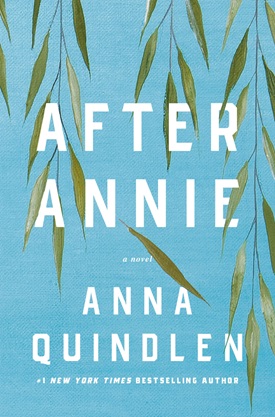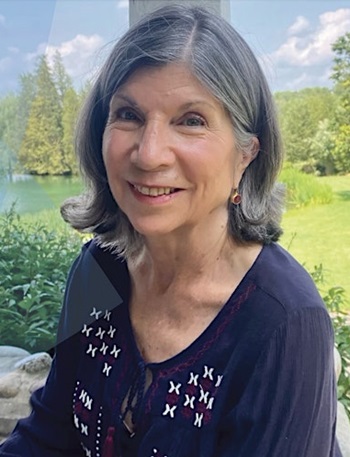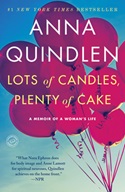 Synopsis:
Synopsis:
Author Anna Quindlen brings her trademark wisdom on family, emotions, and the secrets of people in a small town to her novel about triumph over adversity and the power of love to transcend time.
When thirty-seven-year-old Annie Brown dies suddenly, her husband, four young children, and closest friend are left behind to struggle without the woman who centered their lives.
Bill Brown finds himself overwhelmed, and Annie’s best friend since first great, Annemarie, is lost to old bad habits without Annie’s support. It is Annie’s daughter, Alexandra (Ali), who is forced to try to care for her younger brothers and even her father. She manages to maintain some semblance of their former lives for all of them and confronts the complicated truths of adulthood.
Yet over the course of the next year, while Annie looms large in their memories, Bill, Annemarie, and Ali are able to grow, change, and even become stronger and more sure of themselves. The enduring power Annie gave to those who loved her is the power to love . . . and to go on without her.
After Annie is a story that ends with hope, illustrating how adversity can change us in profound ways.
Review:

Anna Quindlen is known for crafting relatable stories about ordinary people who find themselves facing unexpected challenges that leave them profoundly and irrevocably changed. The strength of her writing style is its understated simplicity and humanity.
“Bill, get me some Advil, my head is killing me,” thirty-seven-year-old Annie Brown says to her husband as she is serving dinner — meatloaf, mashed potatoes, and peas — to him and their four children on an otherwise unremarkable evening. “Bill,” she said again, “and then she went down, hard,” on the kitchen floor. Bill ran to her, scooped her into his arms, and carried her to the living room floor as he yelled to thirteen-year-old Ali to call 911. He took the telephone from her and began explaining what happened to the dispatcher as Ant, Benjy, and Jamie also watched helplessly from their seats at the kitchen table. Bill accompanied the ambulance to the hospital, leaving Ali, bewildered and frightened, to look after the younger children. Eventually, the two little boys ate some dinner, and Ali cleaned up the kitchen and got them into bed. She finally dozed off on the living room couch but was awakened at 3:11 a.m. by the sound of someone opening the back door.
Bill saw Ali on the couch and collapsed on the floor, crying. Neither of them was able to move. Finally, Bill said, “Oh, my God. What the hell am I going to do?” And any hope Ali still held out, dissipated. Bill did not need to say the words. She knew her mother was dead.
In After Annie, Quindlen examines the life of Annie’s family during the first year after her sudden death from a brain aneurysm as they grapple with loss, grief, and a future that looks nothing like it did immediately before that one pivotal moment. From her characters’ perspectives, Quindlen reveals their turbulent emotions, examines their search for peace and acceptance, and explores their efforts to adapt to a new sense of normalcy and routine.
For Bill, Annie’s death is overwhelming and, for a time, paralyzing. And not just because he loved her completely, even though they married “too fast and too young.” He depended upon her. He needed her. She was the center of his world, as well as his children’s. “Annie had been a natural mother” who was happy and content with her “lovely reliable life that went on day to day with the occasional occasion, a party, a new baby, dinner out, vacations.” She worked hard at the local nursing home where she was beloved by residents and staff alike. She adored her children and husband, as well as her best friend, Annemarie, with whom she had an unbreakable bond despite conflicts, resentments, and times that called for unyieldingly tough love. The life she and Bill shared was “enough,” a fact that Annemarie could not always relate to or understand.
Even though Bill tries to “pull himself together” – he felt as though he was “leaving pieces of himself wherever he went, in every room, like he was dismembered by loss” – he has no idea how to do so. He must keep working to provide for his family – he is a plumber and Annie’s income was necessary to keep their household running – and take care of his children. He doesn’t know any of the details he relied upon Annie to remember and manage: the names of the kids’ teachers, doctors, and friends, their clothing and shoe sizes, when appointments are or need to be scheduled. He increasingly foists responsibility upon Ali and feels guilty about it, but incapable of handling things himself. And as his overbearing, self-centered mother, Dora, who owns the house in which they reside and with whom Annie had a fractious relationship, pressures him to “move on,” only making things worse, he reconsiders his life. “Was his life a choice or an accident?” Dora never liked Annie because she thought Bill could have fared better by marrying his high school girlfriend, Liz, a perky real estate agent who is eager to take Annie’s place . . . with Dora’s blessing. But a new relationship, along with all of the other changes Liz attempts to impose on the Brown family, is not what Bill – or his grieving children – need. He feels as though is life is “bring run by women” –wasn’t it always? – and he recognizes that he must find his own voice and be assertive, make appropriate choices for himself and his family, and stand on his own for the first time in his life.
Ali finds returning to school after her mother’s death difficult and Annemarie observes that Annie would be heartbroken that Ali seems to have become “a grownup in an instant.” Ali does not want to cry because that will make it “all true,” and she is displeased when forced to participate in sessions with the school counselor. Her best friend, Jenny, a secretive girl from a wealthy, overprotective family, reminds Ali not to share her feelings with the counselor. No good could come from it. Rather, the counselor would “become your extracurricular activity, and you would become that kid.” “I didn’t lose my mother,” Ali explains to Ms. Cruz, who is new to the school. “I hate it that people say that. I didn’t lose her, and she’s not gone, and she didn’t pass away. She’s dead.” Ali isn’t eating and is bothered by the fact that her father and brothers have stopped talking about her mother. She resents her father’s attempts to move on with his life, particularly the time he spends with Liz instead of at home, noting that he can find a new wife, but she and her brothers can never have another mother. Over the course of the next few months, Ali does open up to Ms. Cruz as she grows taller, developing into a young woman. Her understanding of the adults in her life and their shortcomings expands as she learns to trust her own instincts, forgive, and appreciate that although her mother may not be physically present any longer, their connection to each other can never be severed.
At the age of eleven, Annie’s death exacerbates Ant’s already-simmering anger. Unsure how to respond to his outbursts or comfort his oldest son, Bill proceeds with Annie’s plan to send him to camp where his behavioral problems amplify. With each passing day, Ant becomes crueler, hurling vile insults at others. Benjy requires a tutor because he is having difficulty learning to read and six-year-old Jamie just wants to know when his mother is coming home. He insists that she is “being patched up at the hospital.”
For Annemarie, the magnitude of the loss of the woman who has been her best friend since first grade defies description. Annie was Annemarie’s life compass. She knew the real Annemarie and, unlike others, was never fooled by her. Annemarie recalls how Annie literally saved her life, but accepted no excuses and threatened to turn her back on Annemarie forever if she failed to match Annie’s belief in her and efforts on her behalf. Fear of how desolate her life would be without her best friend and most stalwart supporter kept Annemarie clean and sober. But losing Annie has destroyed Annemarie’s equilibrium, and her already prickly relationship with Bill is “curdling” without Annie there to mediate. She is reeling, spiraling out of control, and veering toward abusing prescription drugs again. Will anything stop her from destroying her marriage, business, and life?
The story opens in winter and Quindlen’s narrative moves forward through the seasons until it is winter again and the first anniversary of Annie’s death. Quindlen’s riveting story compassionately details how the Brown family becomes utterly lost when Annie dies, unequipped to navigate the shocking and unspeakably profound departure of their wife, mother, and irreplaceable friend. Quindlen’s depiction of how they find their way through the haze of grief and sorrow that descends upon them is compelling and credible. Every one of Quindlen’s fully developed characters is flawed and vulnerable, their imperfections magnified in the wake of Annie’s absence. They are also sympathetic and, largely, likeable. Even Dora, pushy and domineering, is empathetic because she loves her son and wants the best for him and her grandchildren, and her worldview is the culmination of her own life experiences. So there are no villains in this story. Rather, the characters are a group bound together by their love for and relationships with Annie who must reevaluate and redesign their connections to and interactions with each other, and their own lives, without her. Once again, Quindlen, who the New York Times aptly alls an “anthropologist of domesticity,” probes the nuances of everyday life – shock, grief, mourning, and finding happiness again – with quiet, eloquent insight and tenderness. Small details, like the way characters continue calling Annie’s phone just to hear her voice and how scents evoke memories and longing, resonate. After Annie is a richly emotional story populated with characters about whom readers will care deeply as they contemplate their own reaction to and capacity to navigate loss and rebuilding.
Excerpt from After Annie
Annie Brown died right before dinner. The mashed potatoes were still in the pot on the stove, the dented pot with the loose handle, but the meatloaf and the peas were already on the table. Two of the children were in their usual seats. Jamie tried to pick a piece of bacon off the top of the meatloaf, and Ali elbowed him. “Mom!” he yelled.
“Bill, get me some Advil, my head is killing me,” their mother said, turning from the stove to their father, her ponytail waving at them, her hair more or less the same shade and texture as the Irish setter’s down the street. She’d done the color herself, and she said she wasn’t happy with it, too brassy, but she figured she’d just let it go. Her husband said it looked fine. Of course he did.
“Bill,” she said again, looking at him with a wooden spoon raised in her hand, and then she went down, hard, the spoon skidding across the floor, leaving a thin trail of potatoes, stopping at the base of the stove. Ali didn’t see it because she was still policing her little brother, but she heard it.
Ant and Benjy came running in from the back room when they heard their dad yelling, “Annie! Annie! Jesus Christ!” Her husband tripped over the spoon as he ran to her, lifted her like it was nothing, and carried her into the living room. He pushed the coffee table into the wall with his foot so he could lay her down flat in the middle of the floor.
“Call 911, Ali,” he said to his daughter.
“What is your emergency?” said the woman, who had an accent that sounded like she was from somewhere else.
“My mother fell,” Ali said. It didn’t seem like enough, but she didn’t know what else to say.
“Give me the phone,” her father said. “Get out of the way.”
The kids all went back and sat still at the kitchen table as though if they moved it might make things worse. It was so quiet that Ali could hear them all breathing, especially their father. After a few minutes there was the faint sound of a siren, the faraway sound the kids heard when they had been sent to bed and Annie and Bill were watching some cop show in the living room and had turned the volume down. The siren got louder until it was all around the five of them, in them, in their teeth and their skulls, and then it stopped, and crash, crash, crash, things moving outside, and then the crew was through the front door as their father held it open and their mother lay still. No one ever used the front door. If someone rang that bell, Annie always said, “Now who in the world can that be?” When the family came into the house, they came in through the kitchen. There was a mat there, bristly, brown, to wipe their feet on, and a bench inside to leave their shoes on. No outside shoes in the house—that was the rule. “Is she part Japanese?” Annie’s mother-in-law once asked.
It was weird, the kitchen and the living room like two different places, two different stories, two different planets. Behind the big arch that separated the two rooms, the four children sat at the kitchen table frozen into something like a family photograph, meatloaf, peas, salt, pepper, the Brown kids gathered for a weekday dinner, Jamie, the youngest, with a smear of barbeque sauce on his fat pink cheek.
The EMTs made a wall of blue canvas backs around Annie so that all you could see were her slippers, like her feet were all that was left of her. Bill Brown bounced from side to side, adrenaline all over, his eyes big and then blinking, big and then blinking, like someone in a movie who was trying to send secret distress signals without giving anything away to the bad guys. Annie’s slippers were purple and Bill had given them to her for Christmas even though she had told him she wanted a locket. They all heard her, a heart-shaped locket to put a picture in. “These are nice,” she’d said when she opened the box and found the slippers. She’d prepared herself; you couldn’t see a shoebox shape and think there was a locket inside unless your husband was the kind of man who would put a small box in a bigger one as a trick, and Bill wasn’t that kind of guy.
When she came home from working at the nursing home in the evening or the morning, depending on her shift, she would take off her rubber clogs at the back door and put on the purple slippers. Sometimes Bill would smile when she did that, like he was thinking he’d done good. He said that when he was happy about something: “I done good.”
There were the slippers, still, as if no one was wearing them, and there was Bill, bouncing up and down in the living room, his mouth open, panting. Hyperventilating, Ali said to herself, remembering Girl Scout training. She wondered if her father was going to faint, if there would be the two of them lying there on the rug, both their parents, their kids staring. “Stand back, Bill,” one of the EMTs said, both men leaving wet, gray spots on the carpet from the old snow they’d picked up on their shoes outside. One of them was a man whose son used to be on Ali’s Little League team. One of them was someone Bill and Annie had gone to high school with. They lived in that kind of place.
Jamie was still picking idly at the meatloaf so that one crispy corner of it was all picked out and most of the bacon was gone, but now Ali wasn’t going to stop him. Ali was staring at her mother’s feet. They hadn’t moved once. She kept waiting for her mother to sit up and say “What happened?” or “I’m fine” or “Let me up.” She kept waiting for the EMTs to do that thing with the paddles, to shock her mother’s heart back to life. She figured that even if she couldn’t see anything but the men’s backs, she would hear that sound, pop pop, and her mother’s feet would do a little jump. They had one of those machines in every hallway at the nursing home where her mother worked. Her mother had shown Ali when she’d visited once. “Do you know how to use that?” Ali had asked. “Of course,” her mother said. “It wouldn’t be much use to people if I didn’t.”
“Let’s get her on the gurney,” Ali heard one of the men say.
“What’s a gurney?” Benjy whispered.
“I’m coming with you,” their father said, and really fast they were out the door, him, her, the EMTs, and then there were all the hard metal sounds of things moving and slamming, the ambulance starting up and the siren wailing, then dwindling, as the ambulance moved off their street. The living room felt as empty as if there were no one home, the way Ali figured the house did in the mornings after they’d all gone to school and their parents had left for work and the only sound was the furnace in the basement clicking on and off, the hot air whooshing up through the vents, the occasional creak of the hamster wheel from Ali’s room.
It was quiet now except for the sound of Jamie sucking barbeque sauce off his fingers and some murmurs from outside that were the sounds of neighbors, even in the cold, on their front steps trying to figure out what was going on over at the Brown house. A siren didn’t sound on their street without everyone coming out to see. They’d done the same thing themselves. Chimney fire, their father might say, sending everyone back inside as the fire engine backed down the block.
“Where are they going?” said Benjy.
“The hospital, dumbass,” said Ant.
“Shut up,” Ali said. “Don’t be mean to him.”
“You’re not the boss,” said Ant, like he always did.
“What happened to Mommy?” said Benjy.
“I don’t really know,” Ali said.
Ant and Ali didn’t eat anything, but the two little boys had meatloaf and even some potatoes, though they were cold, with ketchup on it all. They didn’t eat the peas because there was nobody to make them do it. “We should go to bed,” Ali said. “We have school tomorrow.” Jamie and Benjy went to their room, and when Ali checked on them they were asleep, their clothes on the floor, no face washing, no tooth brushing, but she wasn’t going to wake them up for that. Benjy had his thumb in his mouth, and in the quiet she could hear him sucking on it, just the way she’d heard him when he was a baby and couldn’t be without a pacifier for even a minute.
The little boys had bunk beds up against the wall, but Ant had a twin bed up against the window. He was lying down flat and staring out.
“Is she going to die?” he said without turning his head.
“What are you talking about?” Ali said kind of meanly, even though she was thinking the same thing. Her mother’s feet, so still.
She went downstairs and sat on the living room couch. The house felt big all around her, even though it wasn’t, like it had expanded without the grown-ups in it. It’s not like they hadn’t been left alone before with her in charge, like after school when their parents were both late from work, or when their mother and father went to the diner for dinner. But that was always planned. Ali, put the mac and cheese in the oven. Make sure Jamie does his eye exercises. One hour of TV, and that’s it. They never just got left like this, like everyone had forgotten they were even there.







Comments are closed.